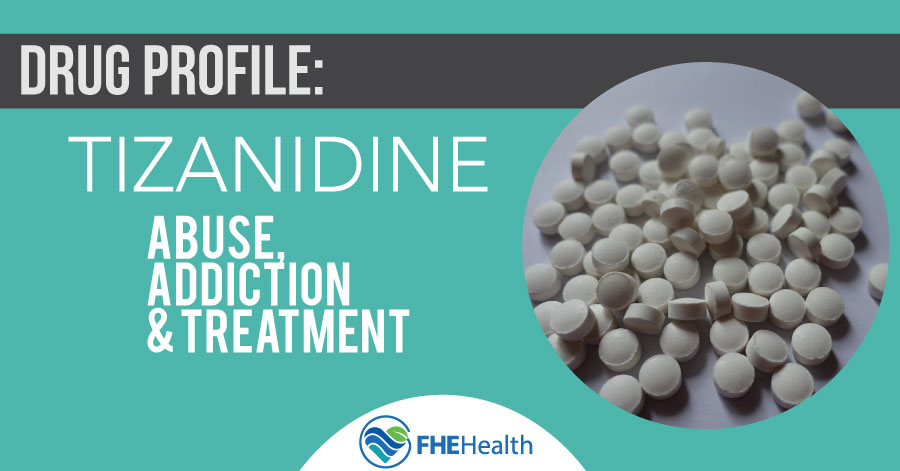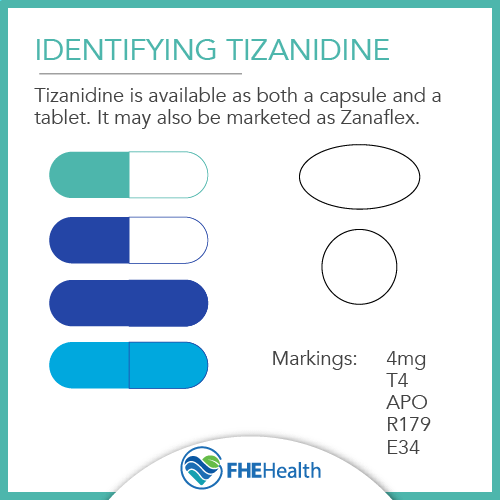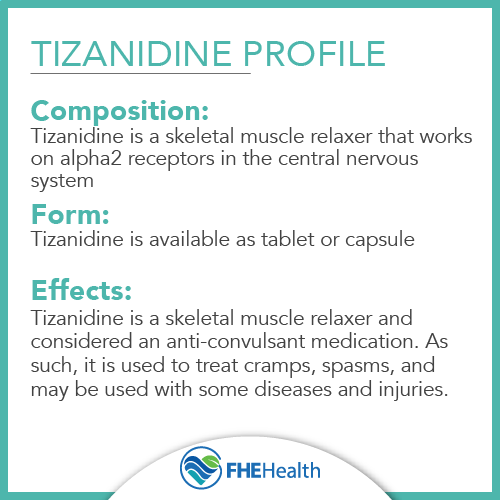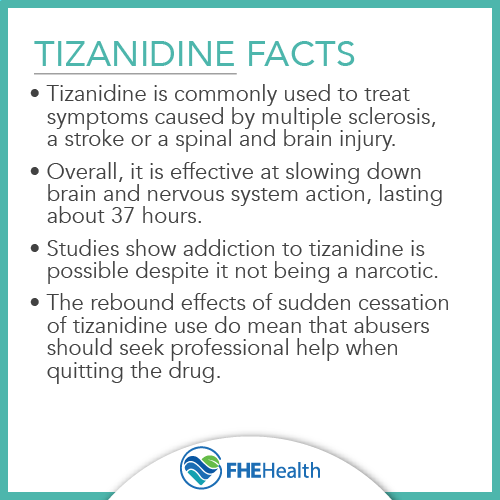
Like many other prescription FDA-approved medications, tizanidine can be addictive. Tizanidine is not a narcotic. The drug is considered to be a muscle relaxer that helps to reduce pain but in a different way than a narcotic. Rather than binding to pain receptors in the central nervous system, tizanidine blocks pain involving the skeletal muscle areas. Because tizanidine is not a narcotic, there is a societal perception that it is not as dangerous or addictive as narcotics. Consequently, tizanidine abuse has become more socially acceptable.
Identifying Tizanidine
 Tizanidine comes in the form of small white tablets, commonly imprinted with E34. The most common brand name is Zanaflex, and it is most often prescribed for treating muscle spasms. When abused, the medication is taken more often and for a longer duration than medically recommended. Tizanidine is a generic prescription drug but is known by other brand names, including:
Tizanidine comes in the form of small white tablets, commonly imprinted with E34. The most common brand name is Zanaflex, and it is most often prescribed for treating muscle spasms. When abused, the medication is taken more often and for a longer duration than medically recommended. Tizanidine is a generic prescription drug but is known by other brand names, including:
- Zanaflex
- Sirdalud
- Relentus
- Tizanadine (intentional misspelling)
- Xanaflex
What Does Tizanidine Do?
 Tizanidine is an antispasmodic prescription drug prescribed to be taken orally at designated intervals of time. It is typically used to treat symptoms occurring as the result of multiple sclerosis, stroke, spinal and brain injury. The drug is a controlled, pain-relief medicine that must be prescribed by a doctor.
Tizanidine is an antispasmodic prescription drug prescribed to be taken orally at designated intervals of time. It is typically used to treat symptoms occurring as the result of multiple sclerosis, stroke, spinal and brain injury. The drug is a controlled, pain-relief medicine that must be prescribed by a doctor.
Is Tizanidine a Narcotic?
A common question asked is, “Is Tizanidine a narcotic?” The answer is that it is not a narcotic because it is a muscle relaxer. Technically speaking, it is an alpha-2 adrenergic agonist used for treating:
- Muscle cramping
- Muscle spasms
- Extreme tightening of muscles
Common Conditions Tizanidine Treats
Traumatic injuries and some diseases may require the use of tizanidine, including:
- Spine or central nervous system injuries
- Spastic diplegia
- Severe and persistent back pain
- Multiple sclerosis
Tizanidine is an FDA-approved muscle relaxer medication used to treat muscle spasticity caused by:
- Traumatic brain injury
- Multiple sclerosis
- Spinal cord injury
It can also be effectively used to manage pain associated with:
- Lumbosacral neuralgia
- Chronic neck issues
- Musculoskeletal pain syndrome
- Migraine headaches
Additional Uses of Tizanidine
Tizanidine is used in some cases as an anti-convulsant effective for the management of migraine headaches and severe insomnia. Spasms and muscle tone are symptoms in those who have had a stroke, multiple sclerosis, or brain or spinal injury. It is effective for slowing down brain and nervous system action, allowing the muscle systems to relax.
How Long Does Tizanidine Stay in Your System?
Muscle relaxers have a half-life of about 37 hours, and it takes 3-5 days for the drug to be completely eliminated from your body.
Addiction to Tizanidine
A case study conducted by NIH reported that addiction to tizanidine occurs when the average dose exceeds 20 to 36 mg. If you have been taking tizanidine regularly for a prolonged period of time, you will more than likely experience symptoms once you cease to take it.
Does Tizanidine Have Addictive Qualities?
Like many other similar drugs, tizanidine can be addictive. Sometimes, addiction develops as the result of misuse; at other times, prolonged use may lead to addiction. Tizanidine affects the central nervous system, which leads to withdrawal symptoms when it is stopped immediately.
What Are the Dangers of Abusing Tizanidine
If you are taking tizanidine in high doses for a prolonged period (more than nine weeks), you may experience the following symptoms:
- Hypertension
- Tachycardia
- Spasticity
Those who abuse this drug typically mix it with other drugs, which can cause more complicated risks and side effects. Severe drowsiness, increased euphoria, confusion and/or other symptoms are common.
Doctors employ a gradual reduction plan for patients taking tizanidine to try to avoid withdrawal symptoms. The withdrawal symptoms experienced may include:
- Tachycardia
- Hypertension
- Tremor
- Hypertonia
- Severe anxiety
Tizanidine is a short-acting medication, and its effects take 1-3 hours to activate.
Signs of Short-Term and Long-Term Abuse
 Patients who abuse tizanidine may do so because they are experiencing pain and want to relieve their pain using the muscle relaxer. However, taking higher doses than what is prescribed often provides a euphoric feeling that can become addictive.
Patients who abuse tizanidine may do so because they are experiencing pain and want to relieve their pain using the muscle relaxer. However, taking higher doses than what is prescribed often provides a euphoric feeling that can become addictive.
If you notice that a loved one is experiencing the following physical issues, they may be suffering from the potential side effects of tizanidine abuse or addiction:
- drowsiness or weakness;
- nervousness
- blurred vision
- flu-like symptoms
- intense dry mouth
- abnormal liver function
- chronic runny nose or sore throat
- urination problems
- sporadic muscle movements
Tizanidine may impair thinking or reactions. The risks of poor judgment and falling asleep at the wheel are high for those who drive while taking tizanidine. Avoid getting up too fast from a sitting or lying position, or you may feel dizzy. Get up slowly and steady yourself to prevent a fall.
Challenges of Identifying Addiction
A short-term addiction to tizanidine can be tricky to identify: It does not manifest itself in the more obvious ways that a short-term addiction to narcotics would. The most dangerous part of tizanidine addiction is the risks associated with withdrawal when a long-term user stops taking the drug.
Preventing Tizanidine Addiction
To prevent addiction, it is important that patients take the drug exactly as prescribed and stay in close communication with their healthcare provider. Often, patients are instructed to take tizanidine up to three times in one day if needed. Allow 6-8 hours to pass between doses.
Tizanidine may be taken with or without food, but it is important to take it the same way each time. Taking tizanidine with food sometimes and taking it without food other times can reduce the effectiveness of the medicine. Follow your doctor’s instructions carefully and contact your doctor immediately if you notice any changes.
Treatment for Tizanidine Addiction
As with other drugs, treatment for tizanidine addiction will depend on the severity of the addiction. Withdrawal should be supervised by a doctor to minimize potentially dangerous withdrawal symptoms. A step-down regimen by which the dosage is gradually reduced over time is the best course for addressing dependency and addiction.
Tizanidine side effects are commonly present after the medication is abruptly stopped, which is why doctors will regulate the process. Most Tizanidine warnings are related to the withdrawal of the medicine. Related warnings include:
- Hypotension
- Liver injury
- Increased drowsiness
- Hallucination
- Hypersensitivity reactions
- Withdrawal adverse reactions
- Nonclinical toxicology
Going off the drug on your own is dangerous and may lead to severe symptoms. The way in which other drugs interact with the drug can also increase the danger and complicate the treatment plan. Often, treatment for a tizanidine problem can be completed in an outpatient capacity. When an addiction is severe, inpatient treatment is the better choice.
Break Free from Tizanidine Addiction
If you or a loved one is struggling with tizanidine addiction, FHE Health can help. Our experienced team of medical professionals offers comprehensive treatment programs tailored to your individual needs. We provide a safe and supportive environment for recovery, including medical detox, therapy, and ongoing support. Contact us today for a confidential consultation and learn how FHE Health can guide you on the path to recovery.






